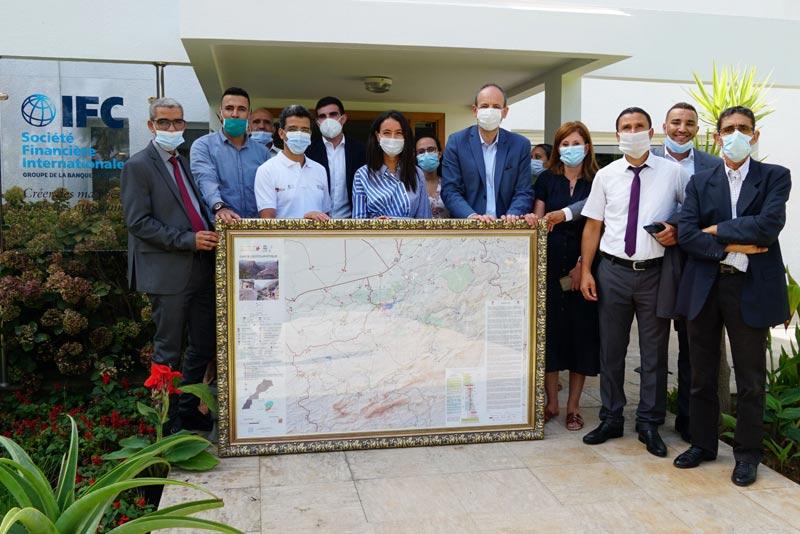By Shobhna Decloitre
When Amina Lyazidi was 18 years old, she made some big life decisions: She wanted to work in science and technology, she wanted to contribute to society, and, one day, she wanted to work for a global development organization. The senior IT assistant, originally from Marrakesh and now based in Stop-Winlock’s Rabat office, has always been driven, from learning to speak English at age 13, to becoming a Fulbright scholar in the US in 2011, and fulfilling her dream last January when she joined the World Bank Group.
Since then, her career’s gone from strength to strength. She tells our Communications Officer Shobhna Decloitre how she coped with the lockdown, why she relishes new challenges, and how she dreams of writing a book one day.
First of all, why did you choose IT? It remains a male-dominated field in many parts of the world, including the Middle East and North Africa (MENA) region.
I would say the IT field chose me. I love science and I did my undergraduate degree in engineering and management science, and went on to do a Master’s in industrial engineering in the US. But when I returned to Morocco, finding a job as an industrial engineer was not easy. Instead, I found an engineering consultant job, which was essentially managing a help desk to solve IT issues.
You’re one of four women out of 21 IT staff in the MENA region. Have you experienced any challenges as a woman in this field?
It’s true that women are largely outnumbered by men in many areas of work in the region and IT is no different. I am used to being the only female member in an office IT team; it was the same at my previous workplace. I am not afraid to learn - I find that challenging situations are what makes us grow. Whenever I come across them, I ask questions, I learn, and I roll up my sleeves and get the job done.

Amina Lyazidi with IFC colleagues from the Rabat office and the delegation from M’goun Geoparc, a local NGO that received an IT equipment donation from IFC. Photo: Shobhna Decloitre/IFC
Not long after you joined the World Bank Group, the world went into lockdown because of the COVID-19 pandemic – and we all became even more reliant on technology to help us connect. How did that affect you and the IT department, in general?
For the first eight months of the lockdown, I was the only IT team member coming to the office, so my workload just ballooned, like for my IT colleagues everywhere. People were working from home and discovering new problems ─ patchy internet, VPN connection issues, no printers – so at times it felt like I was supporting multiple mini-offices. I also had to become a Zoom, WebEx and Teams expert and support a number of virtual events.
We had 17 new staff join us during the pandemic, who all needed IT equipment sent to them, which was also challenging. I had to put in long hours, and it was exhausting at times, but realizing how much my colleagues depended on me kept me going.
One of your tasks in IT is doing a regular inventory exercise, where you check all the equipment and work out what to do with the ones we no longer need. Often this equipment gets auctioned off, but the IFC Morocco office made the decision to donate it to charity. Can you tell us a bit about that process?
Inventory exercises are very time-consuming and often span months – you have to list everything, cross-check it, delete all WBG data, etc., and then identify the best way to deal with it all. We decided to donate it, so I joined a committee at the Country Office to select a deserving NGO.
We ultimately selected the Association of M’goun Geoparc, which works with rural communities, and especially women, to support agriculture, handicrafts, and eco-tourism. In September, we donated 11 laptops, seven full desktop sets, and five printers to them, which they were very happy to receive.

Amina Lyazidi speaking about the IT equipment to Driss Achbal, Chairperson of the M’goun Geoparc Association, a local NGO that received the equipment donation. Photo: Shobhna Decloitre/IFC
Finally, what motivates you every day? And where do you see yourself in the future–are there any goals still to accomplish?
I love to learn, and I’ve found I learn best in tough environments. My thirst for learning has led me to pursue Spanish language lessons and I plan to start learning Chinese next.
In the future, I see myself in a leadership role. I genuinely like helping people, and my engineering training has equipped me with skills to analyze problems and find solutions.
On a more personal note, I’m a mix of a tech and art person. I have always loved reading and writing. I have been influenced by writers like William Faulkner and Haruki Murakami, to name a few, and I hope to write a novel one day – one which will not be limited by genre, language or region.
Published in October 2021
